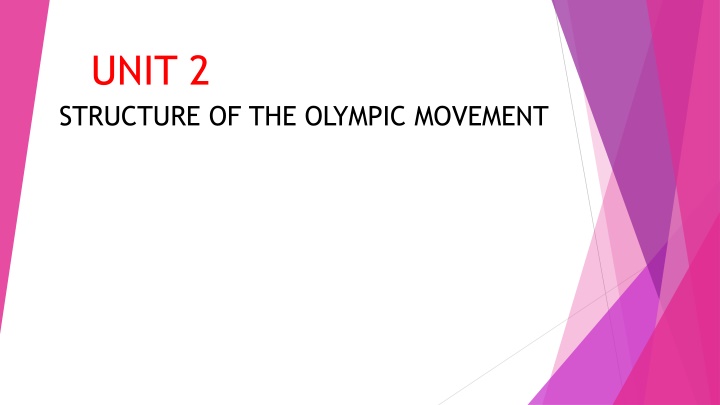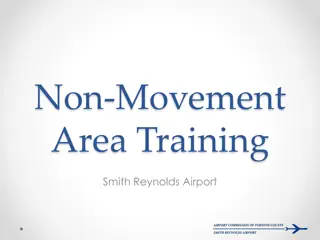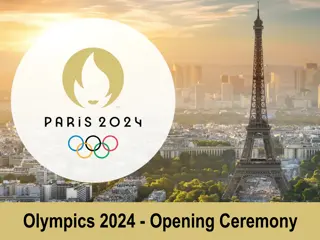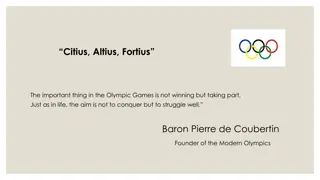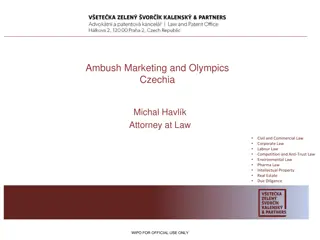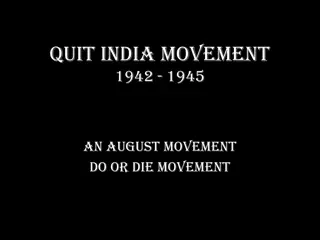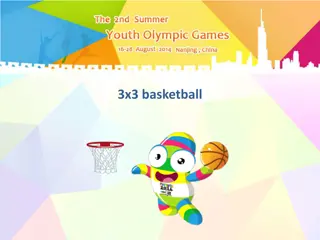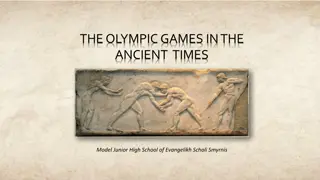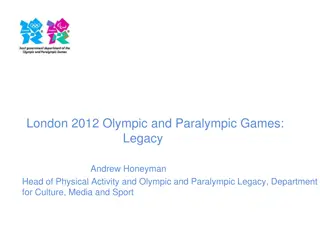Overview of Olympic Movement Structure and Function
The Olympic Movement comprises three main constituents - National Olympic Committees (NOCs), International Olympic Committee (IOC), and International Sports Federations (IFs). NOCs represent countries at the Olympics, promote Olympism, and nominate future host cities. IFs oversee and manage various sports at the world level, ensure fair play, and contribute to the Olympic and Paralympic movements. Recognition by the IOC is crucial for participation in the Olympics. Several popular IFs include Badminton World Federation (BWF), FIFA, FIBA, and IBU.
Download Presentation

Please find below an Image/Link to download the presentation.
The content on the website is provided AS IS for your information and personal use only. It may not be sold, licensed, or shared on other websites without obtaining consent from the author.If you encounter any issues during the download, it is possible that the publisher has removed the file from their server.
You are allowed to download the files provided on this website for personal or commercial use, subject to the condition that they are used lawfully. All files are the property of their respective owners.
The content on the website is provided AS IS for your information and personal use only. It may not be sold, licensed, or shared on other websites without obtaining consent from the author.
E N D
Presentation Transcript
UNIT 2 STRUCTURE OF THE OLYMPIC MOVEMENT
National Olympic Committee (NOC) National Olympic Committees are one of the three constituents of the Olympic Movement, alongside the International Olympic Committee (IOC) and the International Sports Federations. Their role is to ensure the representation of their respective countries at the Olympic Games by sending competitors and officials as well as to promote the fundamental principles and values of Olympism in their countries, in the fields of sport and education. They may also nominate interested hosts as candidates for future Olympic Games. As of 2020, there are 206 National Olympic Committees. NOC recognition can only be granted after recognition as an independent country by the international community. The IOC runs the Summer Olympic Games and the Winter Olympic Games as competitions in which all IOC-recognized NOCs can participate. Each continent also runs its own championships for their members: The five continental Olympic associations are Africa Association of National Olympic Committees of Africa (ANOCA) African Games America Pan American Sports Organization (PASO) Pan American Games and Pan American Winter Games Asia Olympic Council of Asia (OCA) Asian Games and Asian Winter Games Europe European Olympic Committees (EOC) European Games Oceania Oceania National Olympic Committees (ONOC) Pacific Games
The International Sports Federations (IFs) The International Sports Federations are international non-governmental organizations recognized by the International Olympic Committee (IOC) as administering one or more sports at world level. While conserving their independence and autonomy in the administration of their sports. The IFs have the responsibility and duty to manage and to monitor the everyday running of the world's various sports disciplines, including for those on the programe, the practical organization of events during the Games. The IFs must also supervise the development of athletes practicing these sports at every level. Each IF governs its sport at world level and ensures its promotion and development. They monitor the everyday administration of their sports and guarantee the regular organization of competitions as well as respect for the rules of fair play. The IFs may formulate proposals addressed to the IOC concerning the Olympic Charter and the Olympic Movement in general, including the organizing and holding of the Olympic Games, particularly concerning the technical capabilities of the candidate cities; collaborate in the preparation of the Olympic Congresses; and participate in the activities of the IOC commissions. Some international sports federations, such asWorld Aquaticsand theInternational Skating Union, may oversee multiple activities referred to in common parlance as separate sports: World Aquatics, for example governs swimming, diving, synchronized swimming, and water polo as separate "disciplines" within the single "sport" of Aquatics. International sports federations form an integral part of the Olympic and Paralympic movements. EachOlympic sportis represented by its respective international sports federation, which in turn helps administer the events in its respective sport during the Games. For a sport to become an Olympic sport, its international sports federation must be recognized by theInternational Olympic Committee. Likewise, an international sports federation must be recognized by theInternational Paralympic Committeefor its sport to become aparalympic sport.
Badminton World Federation (BWF) F d ration Internationale de Football Association (FIFA) 1. International Basketball Federation (FIBA) International Biathlon Union (IBU) 2. International Bobsleigh and Skeleton Federation (IBSF) International Boxing Association (IBA) +++ 3. International Canoe Federation (ICF) International Equestrian Federation (FEI) 4. International Fencing Federation (FIE) International Golf Federation (IGF) 5. International Gymnastics Federation (FIG) International Handball Federation (IHF) 6. International Hockey Federation (FIH) International Ice Hockey Federation (IIHF) 7. International Judo Federation (IJF) International Luge Federation (FIL) 8. International Modern Pentathlon Union (UIPM) International Shooting Sport Federation (ISSF) 9. International Skating Union (ISU) International Ski Federation (FIS) 10. International Ski Mountaineering Federation International Surfing Association 11. International Table Tennis Federation (ITTF) International Tennis Federation (ITF) 12. International Volleyball Federation (FIVB) International Weightlifting Federation (IWF); 13. The International Federation of Sport Climbing Union CyclisteInternationale (UCI) 14. United World Wrestling (UWW) World Archery Federation (WA) 15. World Aquatics World Athletics 16. World Curling Federation World DanceSport Federation (WDSF) 17. World Rowing (FISA) World Rugby 18. World Sailing (WS) World Skate 19. World Taekwondo (WT) World Triathlon (TRI) 20.
National Sports Federation National Sports Federations NSFs are fully responsible and accountable for the overall management, direction, control, regulation, promotion, development and sponsorship of the discipline for which they are recognized by the concerned International Federation. The National Sports Federation of India (NSFOI) promote the fundamental principles of Sports at a national level within the framework of sports. Recognition of National Sports Federations is to ensure that NSFs maintain certain basic standards, norms and procedures with regard to their internal functioning, which conform to the high principles and objectives laid down by the concerned International Federation, and which are also in complete consonance (taalmel) with the principles laid down in the Olympic Charter. From the year December, 2009, a new system of annual recognition was notified under which NSFs are required to submit detailed documentation for grant of recognition, which would get automatically renewed in the subsequent years. Subjects to submission of prescribed documents such as annual report, audited accounts, details of national championships held, utilization certificate in respect of Government grants. Copies of relevant circulars issued. For determining the eligibility for recognition of NSFs dealing with disciplines which are not included in Olympics, Commonwealth Games or Asian Games, the Government has further notified additional conditions. Now while considering the proposal of such disciplines following criteria will be taken into consideration:- i. Popular Indigenous Games with All India spread ii. Popular School, College and University Sports iii. Availability of required infrastructure v. Affordability of the game vi. Availability of coaches
Olympic volunteers The Olympics bring people, nations, and the world together, including thousands of volunteers! While qualifying for Olympic teams takes years of dedication, practice, and acquired skill but almost anyone can volunteer for the Olympic Games. You could provide needed services across many aspects of the event before, during, and after the competitions. Volunteering for the Olympics is fulfilling and impactful. Becoming an Olympics Volunteer is not as hard as you may think and makes this incredible event possible every two years (winter and summer). There were over 80,000 volunteers working at the 2020 (2021) Tokyo Olympics. Each volunteer comes with a unique skill set which is considered when making assignments. Here are a few of the many volunteer jobs needed to successfully pull off the Olympic Games: Checking tickets and security services: This may include issuing IDs to Olympic workers as well. Translating and acting as a guide: People come from all over the world for the Olympics; you could be welcoming dignitaries and politicians as well as athletes and spectators. Delivering equipment: With competitions occurring at multiple venues and stages serving various purposes, equipment delivery can be more complicated than it sounds Set up and break down of event stages: If you ve ever worked stage crew for a theater, this volunteer opportunity may be right up your alley. Entering data and results: Perhaps the most important part of the Olympic Games getting the competition results entered so athletes can truly become a part of history. Assisting photographers and reporters: Whether manning press conferences or helping to capture a photo from just the right angle, this volunteer position would take some creativity and patience, but ultimately be very rewarding.
In the true spirit of the Olympics, there are few volunteer application restrictions. Typically, you ll need to be available for volunteer training and the events themselves, you should be at least 18 years old, and be fluent in English AND the language spoken in the host city/country. Follow these steps for your best chance at being accepted as an Olympics volunteer: 1. Research and prepare - You ll first want to check dates and make sure you re available for the Games you wish to support. While there are usually few requirements, each Olympic city has their own volunteer recruitment program and eligibility guidelines. 2. Gather materials and strengthen your application - Over 600,000 people applied to the Beijing Winter Olympics so it goes without saying that you ll want to make your application stand out! Emphasize any strong or unique skills you have, such as being bi- or multilingual, a TEFL graduate, healthcare worker, or athlete. Highlight any relevant education, work experience, or prior volunteering. Even driving experience could give you a leg up on the competition! 3. Apply - Navigate to the application on the official Olympic Games page to submit your application. You should receive a notification if you make it to the next round of the application process. 4. Ace the second-round interview if accepted - This is an in-person interview for those within the country holding the Games, or a video interview for those abroad. Decisions are usually made on a rolling basis and you should find out if you scored a golden ticket about 3-12 months out from the event start. 5. Budget wisely and prepare for your trip - One of the challenges you may face if accepted as a volunteer is getting there, apply for volunteer and travel grants, and see if you can find a host family for the duration of your volunteer experience. Make sure you arrive on time and have studied any materials provided
